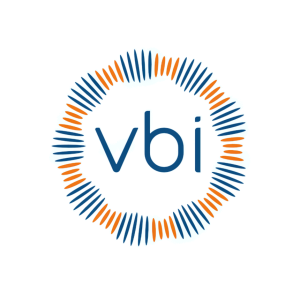VBI Vaccines Presents Encouraging Early Tumor Response Data From Randomized Controlled Phase 2b Study of VBI-1901 in Recurrent Glioblastoma
- Data highlighted in oral presentation at World Vaccine Congress 2024 on April 3, 2024
-
Early data from patients eligible for evaluation at week 12 show two observations of stable disease, indicating no tumor progression, in VBI-1901 treatment arm (n=2/5;
40% disease control rate [DCR]) -
By comparison, no tumor responses have been observed in the control arm to-date (n=0/6;
0% DCR), with all patients seeing a 2-8x increase in tumor size by week 6 - FDA has granted both Fast Track Designation and Orphan Drug Designation to VBI-1901 in recurrent GBM following encouraging Phase 1/2a study results
- Additional interim data expected mid-year and year-end 2024
Dr. Anderson commented: “In recurrent GBM, tumors typically double or triple in size within six weeks, with no effective treatments available to improve survival. Early indications from this ongoing study suggest tumor growth behavior in-line with expectations for both the standard-of-care arm and the VBI-1901 arm, based on positive data seen from the Phase 1/2a study. While early, I am very excited by these results and hope to see the trends continue to confirm the results seen in earlier studies, where VBI-1901 improved median overall survival by ~5 months compared to historical controls – ~13 months vs. ~8 months1 – and achieved a
Based on the data seen in the Phase 1/2a study of VBI-1901 in rGBM patients, the FDA granted Fast Track Designation in June 2021 and Orphan Drug Designation in June 2022.
Dr. Anderson’s presentation will be archived on the Events/Presentations page in the Investors section of VBI’s website.
Phase 2b Data Highlights
As of March 22, 2024, 17 patients have been randomized 1:1 to either the active, VBI-1901 treatment arm, or to the control, standard-of-care treatment arm (SoC).
-
Active Study Arm: VBI-1901 + Granulocyte-Macrophage Colony Stimulating Factor (GM-CSF)
- 9 patients have been randomized and 5 of those patients are currently evaluable for tumor response assessment (n=5)
- 2 stable disease (SD) have been observed in the VBI-1901 arm to-date
-
40% (n=2/5) early disease control rate achieved
-
Control Study Arm: Standard-of-Care (SoC) Therapy – Carmustine or Lomustine
- 8 patients have been randomized and 6 of those patients are currently evaluable for tumor response assessment (n=6)
- No tumor responses have been observed in the SoC arm
-
0% (n=0/6) disease control rate - All evaluable patients have experienced tumor progression and have been taken off study protocol
Phase 2b Patient Enrollment Update
-
14 leading neuro-oncology centers are actively recruiting patients across
the United States - 2 new clinical sites were activated in March 2024, with a third site expected to come online in April
- Patient enrollment in Q1 2024 was double the enrollment rate observed in Q4 2023
Phase 1/2a Study Data Highlights – VBI-1901 10µg + GM-CSF Study Arms
(n=16)
-
44% disease control rate achieved (n=7/16) – disease control rate is defined as stable disease (SD) + partial tumor response (PR) + complete tumor response (CR) -
2 partial responses (PR) were observed – 1 patient was on treatment for more than 28 months (2.33 years), surviving at least 40 months (3.33 years) as of August 1, 2023, with a maximum tumor reduction of
93% relative to baseline - 5 additional patients demonstrated stable disease (SD) for a sustained period of time
- All patients with a tumor response (PR or SD) (n=7/16) reached a minimum survival of 12 months
- Median overall survival (mOS) was 12.9 months, comparing favorably to 8-month mOS for monotherapy standard-of-care1
Phase 2b Study Design
Multi-center, randomized, controlled, open-label study in up to 60 patients with first recurrent GBM
-
Patients will be randomized in a 1:1 ratio across two study arms:
- Intradermal VBI-1901 + GM-CSF: 10 µg dose every 4 weeks until clinical disease progression
- Monotherapy standard-of-care: either intravenous carmustine or oral lomustine, every 6 weeks until disease progression or intolerable toxicity
-
Endpoints include:
- Safety and tolerability
- Overall survival (OS) – median and overall
- Tumor response rate (TRR)
- Progression-free survival (PFS)
- Immunologic responses
- Reduction in corticosteroid use relative to baseline
- Change in quality of life compared to baseline
The
For more information about the Phase 2b study, visit clinicaltrials.gov and reference trial identifier: NCT03382977.
About GBM and VBI-1901
Scientific literature suggests CMV infection is prevalent in multiple solid tumors, including glioblastoma (GBM). GBM is among the most common and aggressive malignant primary brain tumors in humans. In the
VBI-1901 is a novel cancer vaccine immunotherapeutic candidate developed using VBI’s enveloped virus-like particle (eVLP) technology to target two highly immunogenic cytomegalovirus (CMV) antigens, gB and pp65. The FDA has granted VBI-1901 Fast Track Designation and Orphan Drug Designation for the treatment of recurrent glioblastoma. These designations are intended to provide certain benefits to drug developers, including more frequent meetings with the FDA, and Accelerated Approval and Priority Review, if relevant criteria are met, among other benefits.
About VBI Vaccines Inc.
VBI Vaccines Inc. (“VBI”) is a biopharmaceutical company driven by immunology in the pursuit of powerful prevention and treatment of disease. Through its innovative approach to virus-like particles (“VLPs”), including a proprietary enveloped VLP (“eVLP”) platform technology and a proprietary mRNA-launched eVLP (“MLE”) platform technology, VBI develops vaccine candidates that mimic the natural presentation of viruses, designed to elicit the innate power of the human immune system. VBI is committed to targeting and overcoming significant infectious diseases, including hepatitis B, coronaviruses, and cytomegalovirus (CMV), as well as aggressive cancers including glioblastoma (GBM). VBI is headquartered in
Website Home: http://www.vbivaccines.com/
News and Resources: http://www.vbivaccines.com/news-and-resources/
Investors: http://www.vbivaccines.com/investors/
References
- Taal W, Oosterkamp HM, Walenkamp AME, et al. Single-agent bevacizumab or lomustine versus a combination of bevacizumab plus lomustine in patients with recurrent glioblastoma (BELOB trial): a randomized controlled phase 2 trial. Lancet Oncol. 2014; 15: 943-953
- Oncology Center of Excellence, Center for Drug Evaluation and Research (CDER) and Center for Biologics Evaluation and Research (CBER) at the Food and Drug Administration. Clinical Trial Endpoints for the Approval of Cancer Drugs and Biologics; Guidance for Industry. FDA.gov. December, 2018
Cautionary Statement on Forward-looking Information
Certain statements in this press release that are forward-looking and not statements of historical fact are forward-looking statements within the meaning of the safe harbor provisions of the Private Securities Litigation Reform Act of 1995 and are forward-looking information within the meaning of Canadian securities laws (collectively, “forward-looking statements”). The Company cautions that such forward-looking statements involve risks and uncertainties that may materially affect the Company’s results of operations. Such forward-looking statements are based on the beliefs of management as well as assumptions made by and information currently available to management. Actual results could differ materially from those contemplated by the forward-looking statements as a result of certain factors, including but not limited to, the Company’s ability to regain and maintain compliance with the listing standards of the Nasdaq Capital Market, the Company’s ability to satisfy all of the conditions to the consummation of the transactions with Brii Biosciences, the Company’s ability to comply with its obligations under its loan agreement with K2 HealthVentures, the impact of general economic, industry or political conditions in
View source version on businesswire.com: https://www.businesswire.com/news/home/20240403068954/en/
VBI
Nicole Anderson
Director, Corporate Communications & IR
Phone: (617) 830-3031 x124
Email: IR@vbivaccines.com
Source: VBI Vaccines Inc.







